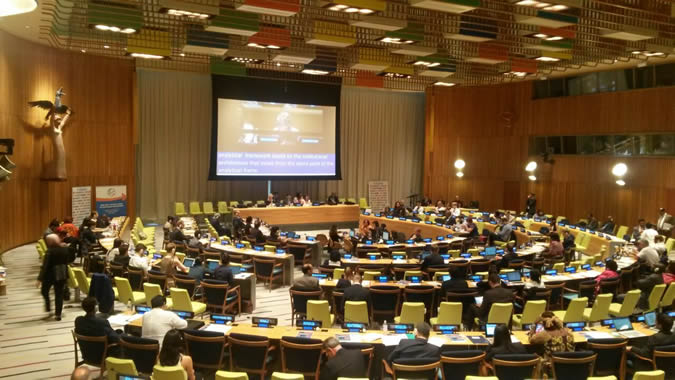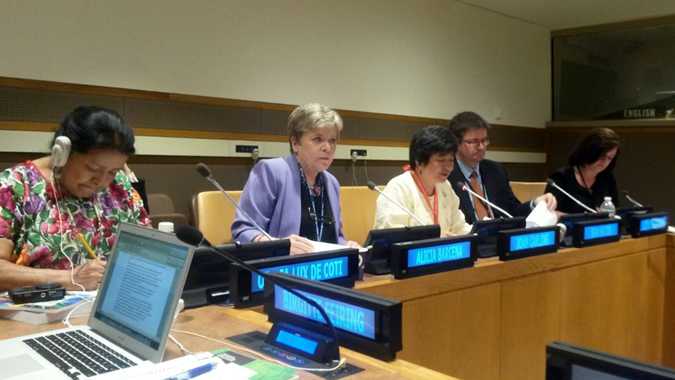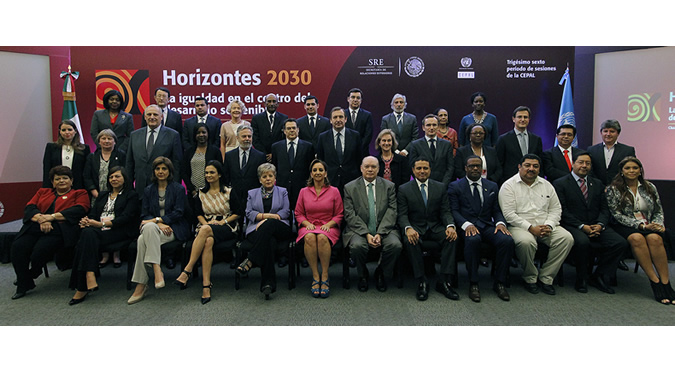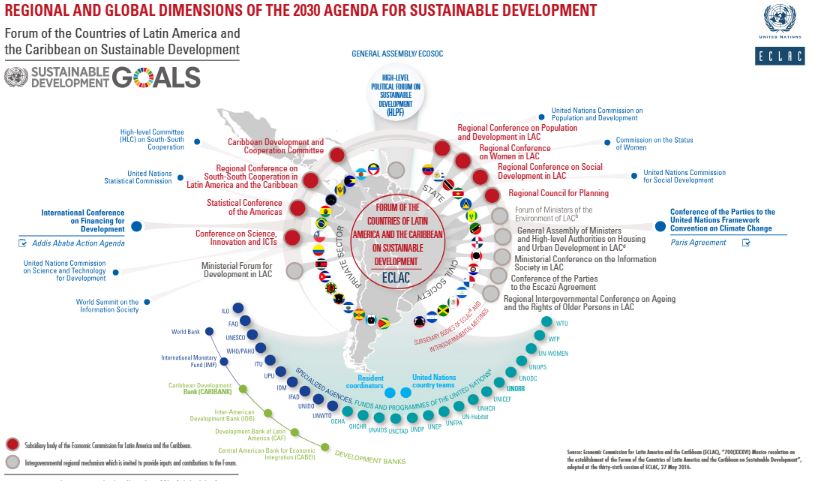Alicia Bárcena: “Maintaining the Prevailing Development Model is No Longer a Viable Option for the World”
ECLAC’s most senior representative participated in a dialogue about regional experiences regarding the 2030 Agenda in the framework of the High Level Political Forum on Sustainable Development, which is being held in New York.

“We are living through a change of era. The world must change its unsustainable development model in an adverse global, regional and national context. Inertial development, ‘business as usual,’ is no longer a viable option for the world,” Alicia Bárcena, Executive Secretary of the Economic Commission for Latin America and the Caribbean (ECLAC), said on Friday.
Bárcena participated, along with the other Executive Secretaries of the United Nations regional commissions and the Presidents of the five regional forums on sustainable development created at the behest of the countries belonging to them, in an interactive dialogue, part of the official programme of the first meeting of the High Level Political Forum that is taking place in New York after last September’s adoption of the 2030 Agenda for Sustainable Development.
On this occasion, ECLAC’s most senior representative highlighted the important progress made in the region in its efforts to establish an analytical and institutional framework for implementing, reviewing and monitoring the 2030 Agenda and the Addis Ababa Action Agenda on financing for development.
The UN official made special reference to ECLAC’s document Horizons 2030: Equality at the Centre of Sustainable Development, which was presented during its thirty-sixth session held in late May in Mexico City, an intergovernmental meeting where the Forum of the Countries of Latin America and the Caribbean on Sustainable Development was created. This forum is the regional mechanism for monitoring and reviewing both the 2030 Agenda and that of Addis Ababa.
In the Horizons 2030 document, as mandated by its member countries, ECLAC provides a Latin American and Caribbean perspective for the implementation of the 2030 Agenda in the region and offers a proposal for the institutional architecture. Firstly, it poses the need for a new international alliance to ensure the provision of global public goods, such as financial stability, climate security, peace and the control of pandemics, among other things.
At a regional level, ECLAC proposes progressive structural change with an environmental big push through new public and private investments and a transition towards knowledge-intensive sectors to create decent, quality employment. “This is the master key to equality,” Bárcena said, adding that this requires the broad participation of the private sector, civil society, parliaments and indigenous peoples, among other actors.
The presidents of the existing five regional forums on sustainable development made presentations during the first bloc of the dialogue: Gamini Jayawickrama Perera (Asia Pacific); Ghada Waly (Africa); Janis Karklins (Europe); Juan José Gómez Camacho (Latin America and the Caribbean); and Amjad Mohammad Saleh Al-Moumani (Western Asia). Other speakers included Badre Eddine Allali, of the League of Arab States; Virachai Plasai, of the Association of Southeast Asian Nations (ASEAN); and Missouri Sherman-Peter, of the Caribbean Community (CARICOM).
Ambassador Juan José Gómez Camacho, Permanent Representative of Mexico to the United Nations and current President of the Forum of the Countries of Latin America and the Caribbean on Sustainable Development, shared some of the mechanism’s priorities and affirmed that the region “decided to rely on the enormous technical capabilities that ECLAC has developed” in this area.
In the second bloc, in addition to Bárcena, the speakers included Christian Friis-Bach, Executive Secretary of the Economic Commission for Europe (ECE) and coordinator of the UN regional commissions; Shamshad Akhtar, Executive Secretary of the Economic and Social Commission for Asia and the Pacific (ESCAP); Rima Khalaf, Executive Secretary of the Economic and Social Commission for Western Asia (ESCWA); and Giovanie Biha, Deputy Executive Secretary of the Economic Commission for Africa (ECA).
The Forum of the Countries of Latin America and the Caribbean on Sustainable Development, Bárcena said, aims to meet for the first time in April 2017 under ECLAC’s auspices. This mechanism is open not only to governments but also to civil society and the private sector, and it will involve as well the Commission’s subsidiary bodies, development banks, other United Nations organisms and regional integration blocs, she said.
The Forum should be a bridge between the regional and global levels, she emphasized.
During the dialogue, Bárcena reaffirmed the commitment to continue this joint work with countries of the region and mentioned three priority areas: the strengthening of the means of implementation of the 2030 Agenda; support for the integration of the SDGs in national development plans and budgets; and the strengthening of national statistics systems’ capacities to follow up on this agenda.
Related content

ECLAC Supports Statistical Visibility and Participation of Indigenous Peoples in the 2030 Agenda
The regional organization’s Executive Secretary, Alicia Bárcena, participated in a side event to the High Level Political Forum on Sustainable Development 2016 being held in New York.

Authorities Establish the Forum of the Countries of Latin America and the Caribbean on Sustainable Development
Authorities gathered at ECLAC’s thirty-sixth session in Mexico decided to establish this Forum as a regional mechanism to follow-up and review the implementation of the 2030 Agenda in the region.

Regional and global dimensions of the 2030 Agenda for sustentainable development
Forum of the countries of Latin America and the Caribbean on Sustainable Development.
Country(ies)
- Latin America and the Caribbean